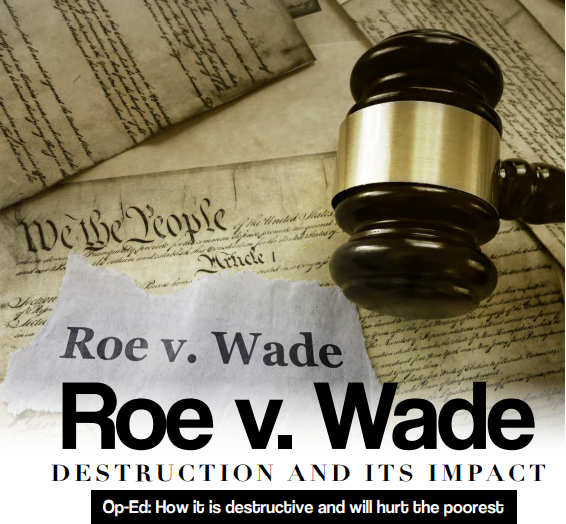Across the world, the principle that decisions on abortion are rightfully a woman’s to make is increasingly reflected in the laws. Most Americans agree with this principle as it aligns with the country’s mantra to be a beacon for democracy and freedom. Yet recently, America has taken a destructive step against women.
On June 24, 2002, the Supreme Court voted to overturn Roe v. Wade, the five-decade-old ruling that in 1973 declared abortion a constitutional right. The court has ripped away a right it granted almost 50 years ago. During that time, pollsters have been told consistently and clearly that most Americans want Roe to stand.
As with most political decisions such as this, the price will be costly, and it will significantly fall on America’s poorest women – women of color.
In American law, history shows no precedents in which a right that was declared fundamental by the Supreme Court was completely retracted. Retraction of the law only sets the nation on a path it has never taken or seen before. It begs the question, what other laws of protection will be erased. It is frightening to even begin to think about what’s next. Reading the Supreme Court text makes you wonder, who can truly check the Supreme Court’s powers?
Supreme Court Text: “We hold that Roe and Wade must be overruled, “Justice Samuel Alito writes. “It is time to heed the Constitution and return the issue of abortion to the people’s elected representatives.”
At Career Mastered, we are advocates for gender equality and women’s rights and believe that this decision is not about babies and abortion, it is about positioning power for elected officials. It is about Republicans and Democrats and women will take the brunt of the hit. Most significant, is that people of color and other marginalized, low[1]income people will be most affected by this overturning of Roe v. Wade according to health and policy experts.
Experts say those who disproportionately have trouble accessing health care, often people of color, will be most impacted.

Fatima Goss Graves, an attorney, and president of the National Women’s Law Center noted that it’s going to impact those who already have barriers to health care, even before an abortion ban. Those who live in rural areas, women of color, those who have ”.low income The following statement was released by Fatima Goss Graves, president, and CEO of the National Women’s Law Center (NWLC):
“Today, we mourn—both for the loss of our reproductive freedom, and for our faith in the Supreme Court’s ability to guard against efforts to undermine our constitution and, in turn, our democracy. But today, we are also angry— with this decision, the Court’s majority has for the first time obliterated a constitutional right and stolen the fundamental ability to control our bodies, lives, and futures. The chaos and generational harm that will ensue did not happen overnight, nor by chance—instead, this strategy was intentionally devised through decades of shameful work by extremist politicians who have weaponized the Court to control people in this country.
“So today, we recommit to action— and find ourselves in lockstep with those who have seen the signs for a decade and those who are just waking to this disastrous news. No matter where you sit this is just the beginning of efforts to eliminate basic protections and rights for all of us. The National Women’s Law Center and our allies in the movement are committed to making this the end of extremist attacks on our rights. They will not win—we will not let them. We will not stop fighting for a future where communities thrive and where we all have the freedom to safely care for our families and live with dignity, equality, and justice. That includes making sure abortion is affordable and available in our own communities, without judgment, stigma, or barriers.”



